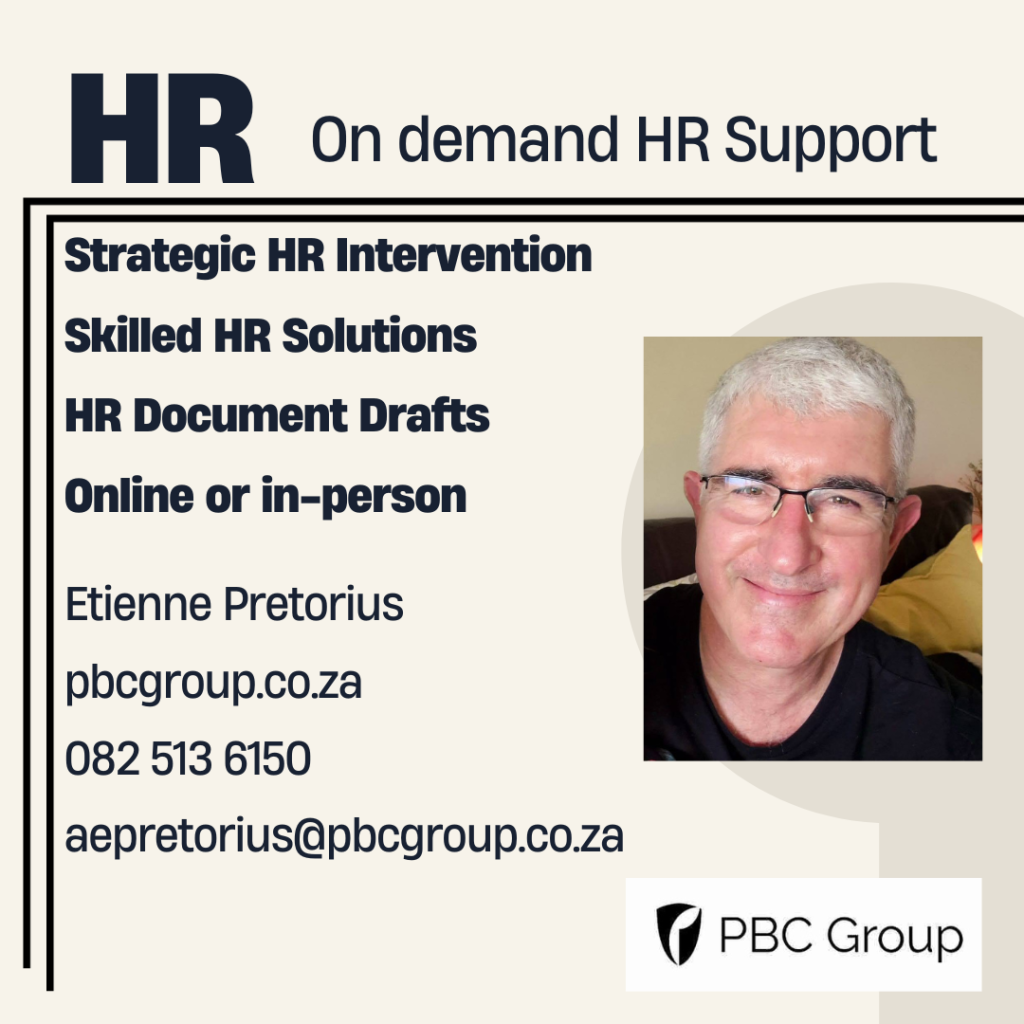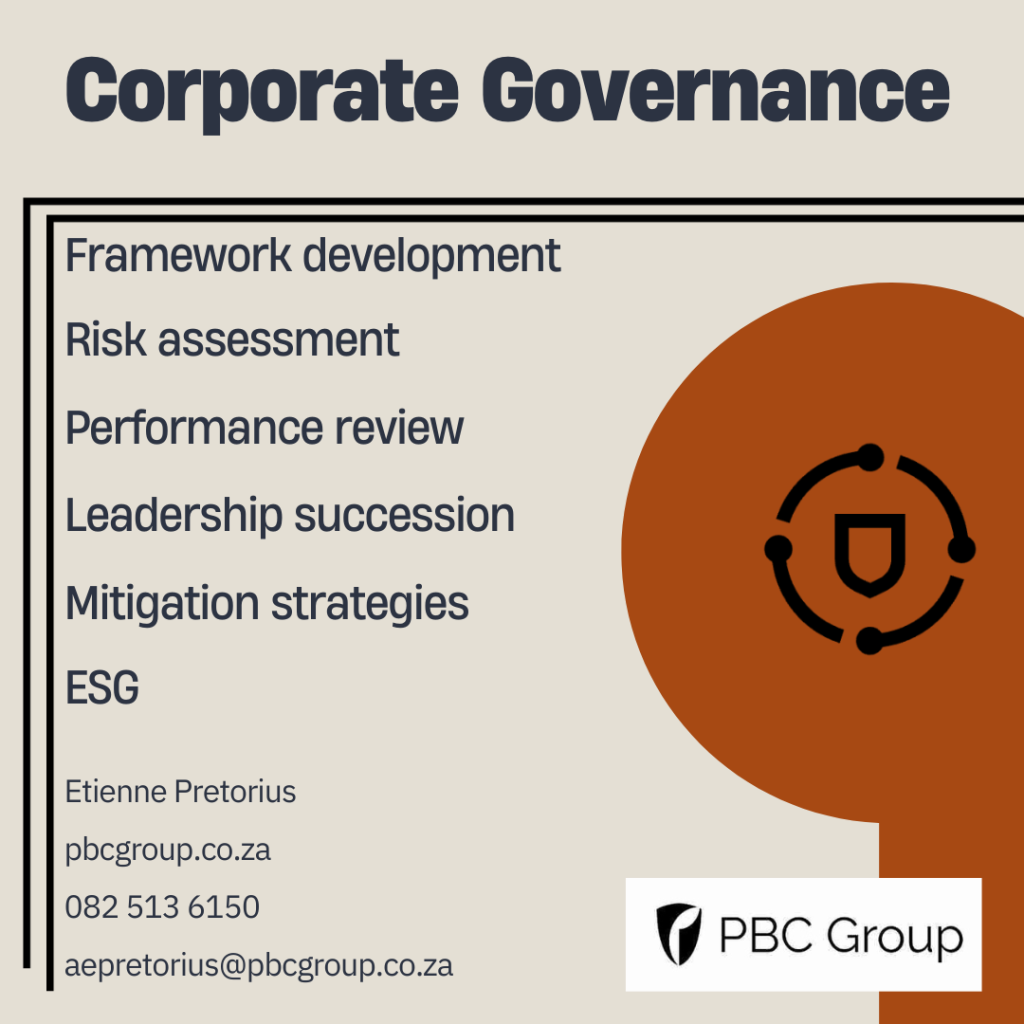Here’s a more detailed breakdown of each HR, Corporate Governance, and AI Governance service, with relevant South African legal considerations and examples.
Legislation mentioned on this page (not exhaustive):
- Protection of Personal Information Act 4 of 2013 (POPI)
- Employment Equity Act 55 of 1998 (EEA)
- Basic Conditions of Employment Act 75 of 1997 (BCEA)
- Skills Development Act 97 of 1998 (SDA)
- Labour Relations Act 66 of 1995 (LRA)
- Companies Act 71 of 2008 (Companies Act)
- National Environmental Management Act 107 of 1998 (NEMA)
- Promotion of Equality and Prevention of Unfair Discrimination Act 4 of 2000 (PEPUDA)
- Cybercrimes Act 19 of 2020 (Cybercrimes Act)

HR Services and South African Law
Strategic HR Interventions – Workforce Planning & Business Alignment
Workforce planning ensures businesses anticipate staffing needs while complying with South African labor laws.
- Example: Under the Employement Equity Act (EEA), organizations must maintain diverse and inclusive hiring practices. Strategic workforce plans ensure compliance with Broad-Based Black Economic Empowerment (B-BBEE) regulations, strengthening company equity scoring.
- Case: A South African company struggling with high turnover designed a workforce planning framework based on employee feedback, aligning business growth with retention strategies—reducing annual attrition rates by 20%.
Skilled HR Solutions – Recruitment, Training & Talent Development
South Africa’s Basic Conditions of Employment Act (BCEA) regulates contractual obligations, working hours, and employee rights during hiring.
- Example: The Skills Development Act (SDA) promotes funding for workplace training initiatives through the Skills Development Levies (SDL) program. Businesses investing in employee training can claim rebates from the South African Revenue Service (SARS).
- Case: A logistics company facing a shortage of skilled drivers implemented Sector Education and Training Authority (SETA)-accredited programs, improving competency levels and securing government funding for training costs.
HR Document Drafts – Contracts, Policies & Compliance Materials
Employment contracts must align with BCEA guidelines, ensuring clear terms on working hours, benefits, and dispute resolution.
- Example: Drafting compliance policies based on the Labour Relations Act (LRA) ensures fair processes for disciplinary procedures, workplace grievances, and retrenchments.
- Case: A financial services firm faced legal challenges after failing to implement proper termination procedures. After revising employment policies, aligned with CCMA (Commission for Conciliation, Mediation, and Arbitration) standards, legal disputes decreased by 30%.
Online or In-person – Flexible HR Support
HR services must comply with Protection of Personal Information Act (POPIA) regulations when handling digital employee data.
- Example: Businesses offering online HR services must have secure systems to store employee records, ensuring data encryption and privacy protection per POPIA compliance mandates.
- Case: A tech startup outsourcing virtual HR support adopted GDPR-aligned security policies, ensuring digital onboarding complied with South African labor laws while reducing administrative costs by 25%.
Each of these HR functions aligns with local labor laws, ensuring companies optimize workforce performance while remaining legally compliant.

Corporate Governance Services and South African Law
Governance Framework Development – King IV Compliance
- The King IV Report on Corporate Governance emphasizes transparency, accountability, and ethical leadership.
- Example: Implementing corporate governance charters that align with King IV principles, ensuring ethical business operations.
Risk Assessment & Mitigation Strategies
- The Companies Act, 2008, requires businesses to conduct financial and operational risk assessments.
- Example: Drafting risk mitigation policies to comply with the JSE Listing Requirements, ensuring public companies meet financial reporting standards.
Board Evaluations & Leadership Succession
- The Companies Act mandates processes for director appointments, board assessments, and succession planning.
- Example: Conducting board effectiveness reviews and succession plans for state-owned enterprises (SOEs) to prevent leadership gaps.
ESG Strategy & Reporting
- The National Environmental Management Act (NEMA) and CRISA 2 (Code for Responsible Investing in South Africa) govern ESG-related reporting.
- Example: Assisting businesses in preparing ESG disclosures for investors and ensuring alignment with global sustainability frameworks.

AI Governance Services and South African Law
Ethical AI Governance – Fairness & Bias Prevention
- South Africa’s POPIA and Promotion of Equality and Prevention of Unfair Discrimination Act (PEPUDA) regulate AI-driven decision-making, ensuring non-discriminatory algorithms.
- Example: Reviewing AI recruitment tools to prevent unintended biases.
AI Risk & Compliance – Cybersecurity & Regulatory Frameworks
- The Cybercrimes Act (2021) mandates safeguards against AI-driven fraud, misinformation, and cyber threats.
- Example: Implementing AI security protocols to detect data breaches and combat automated fraud schemes.
Data Privacy & Security Protocols – POPIA Compliance
- Companies using AI-driven customer data analytics must comply with POPIA privacy protections.
- Example: Ensuring AI chatbots and HR analytics platforms store employee and client data securely while preventing unauthorized processing.
This expanded version connects each service offering with South African laws to ensure businesses operate within legal compliance and governance best practices.
